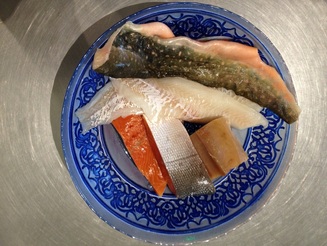
There is no doubt that sustainable seafood should be included in the diet, provided one is not vegan or does not have allergies. Seafood is a significant source of lean protein, often accompanied by the well-known unsaturated fat, Omega 3. Omega 3’s are found in mackerel, herring, kippers, sardines, salmon and anchovies, amongst other fatty fish. Seafood is also loaded with vitamins and minerals required to keep our systems functioning properly and to keep us healthy and free from disease.
The nutrients that I am focusing on are ones that are incredibly important, yet are often missing in a typical North American diet. For example, Vitamin B12 is found only in animal products, including seafood. Vitamin B12 is required for the production of red blood cells, which carry oxygen to cells in the body, and it is involved in the functioning of the central nervous system. Without proper B12 intake, one can end up with anemia and weakness as well as numbing and tingling of the limbs. We need about 2.4mg of Vitamin B12/day. B12 is highest in mussels, crab, oysters, mackerel, prawns, salmon and kippers but cod, haddock and trout are also good sources of this nutrient.
Vitamin D is another nutrient that is often lacking in the North American diet, mostly due to the fact that our skin does not come into contact with the sun on a daily basis. Vitamin D is incredibly important in bone health and a deficiency is linked to osteoporosis. Vitamin D is also involved in the functioning of the immune system as well as disease and cancer prevention. Vitamin D is not found in all seafood, but great sources of Vitamin D include mackerel, trout, kippers and salmon. Tuna, sardines and haddock are also a source of Vitamin D.
Zinc is the final nutrient I chose to focus on. Zinc has a large role in the immune system as well as the nervous and reproductive system. Zinc’s role in the immune system has lead to the use of Zinc and Vitamin C supplements when fighting a cold. Zinc has many roles in the immune system, most notably that it is involved in the production and maturation of white blood cells, which kill viruses. We need about 11mg of zinc/day and we are not always meeting these needs. All seafood is a source of zinc with mussels, prawns, crab, kippers, oysters and sardines being excellent sources.
Other nutrients found in seafood include Vitamin A and Vitamin E, both which are powerful antioxidants, B vitamins (especially niacin and folate), calcium, potassium, phosphorus, magnesium, biotin, iodine and selenium.
It is recommended that we consume two servings of seafood/week. Switch up the sources of sustainable seafood in order to ensure a varied nutrient intake and choose seafood with omega 3’s often as well.
Nicole Marchand, RD
